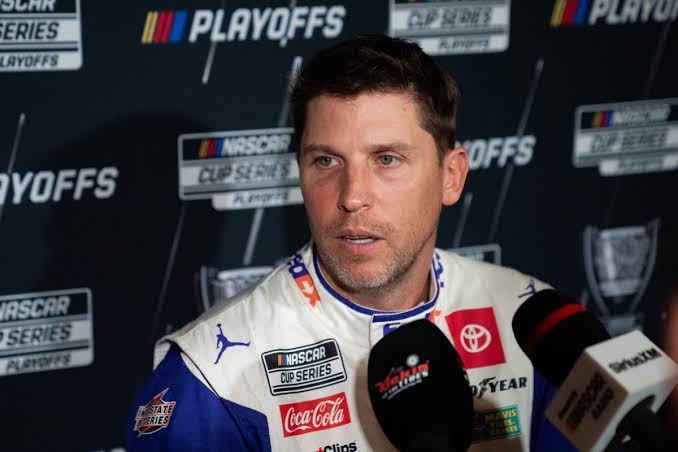Denny Hamlin Speaks Out: Why Atlanta Motor Speedway is Slowing Down Racing
The 2024 NASCAR season has been marked by both praise and criticism, with many questioning whether the changes introduced in recent years have truly enhanced the racing experience. NASCAR President Steve Phelps expressed optimism, claiming, “NASCAR has seen some extraordinary racing this season.”
However, recent races, including the one at the reconfigured Atlanta Motor Speedway, have left some fans and insiders unconvinced. The Atlanta race saw minimal passing and only a few brief instances of a third racing lane, sparking debates about the state of superspeedway racing in the NASCAR Cup Series.
Superspeedway races, traditionally known for their high-speed, edge-of-your-seat action, have shifted focus in recent years. Once defined by thrilling battles for position and aggressive driving, today’s superspeedway races often revolve around strategic decision-making, particularly concerning fuel efficiency.
This shift was on full display during the recent Atlanta race, where many teams prioritized fuel management and minimized pit stops over taking risks on the track. As highlighted on the Door Bumper Clear podcast, this approach has changed the nature of superspeedway racing, making it less about intense on-track competition and more about strategic planning.
Freddie Kraft, a NASCAR spotter and frequent contributor to Door Bumper Clear, voiced his concerns about this new direction in superspeedway racing. He criticized the lack of aggressive driving and suggested that too many drivers and teams are focused on securing points rather than going for the win.
Kraft explained that drivers are being overly cautious, particularly at tracks like Atlanta, where fuel strategy has become a significant factor. While Atlanta may not be as fuel-dependent as Daytona or Talladega, it still plays a critical role in determining race outcomes.
In 2022, NASCAR introduced new regulations for superspeedway races, setting the cars’ horsepower to 510 and installing a 7-inch spoiler for events at Daytona, Talladega, and the repaved Atlanta Motor Speedway. The Atlanta track itself underwent significant changes, with the banking increased to 28 degrees and the racing surface narrowed from 55 to 40 feet.
These adjustments were intended to make the races more exciting and action-packed, but the results have been mixed. Many insiders, including Kraft, feel that while these changes have brought some improvements, they have not entirely succeeded in restoring the thrilling nature of superspeedway racing, largely because of the growing emphasis on fuel conservation.
During the recent Door Bumper Clear episode, Kraft expressed his frustration over the lack of aggressive racing, stating, “I don’t want fuel mileage to dictate our race strategy at plate races.”
He pointed out that Austin Cindric, who had a strong performance in the first two stages of the Atlanta race, faded in the final stage due to fuel concerns. Cindric’s disappearance from contention highlights the impact that fuel strategy can have, even at tracks like Atlanta where it is less critical than at Daytona or Talladega.
Kraft’s criticism extends to the overall approach that many teams have adopted. He argued that drivers are too focused on accumulating points rather than fighting for the win, which ultimately diminishes the entertainment value of the races.
NASCAR introduced the new superspeedway package with the goal of making the races more exciting, but the emphasis on strategy over aggressive driving contradicts that objective. To address this issue, Kraft proposed eliminating stage break cautions, a suggestion that has gained traction within NASCAR but has not yet been implemented.
Kraft’s suggestion is aimed at encouraging more aggressive racing by reducing the opportunities for teams to pit during caution periods, thus placing greater importance on the on-track action. He believes that this change would lead to more exciting racing, as teams would need to focus more on their performance during green-flag conditions rather than relying on strategic pit stops under caution. Fans, too, want to see drivers like Denny Hamlin charging to the front, not playing it safe in the back of the pack to secure points.
Hamlin’s performance in the Atlanta race serves as a prime example of the conservative strategies that have become common in superspeedway races. Driving the #11 car for Joe Gibbs Racing, Hamlin opted for a cautious approach, focusing on securing points rather than making a bold push for the lead. Despite starting from the back, his strategy was designed to maximize his points haul rather than take risks, resulting in a 24th-place finish that left fans underwhelmed.
After the race, Hamlin explained that the lack of grip on the Atlanta track contributed to the slower, more cautious racing. “The track lost grip, and everyone’s cars weren’t handling as well,” he said, noting that the pace was significantly slower than in the spring race.
The Atlanta track was repaved in 2022, but in just two years, it has already begun to degrade, making it harder for cars to handle and reducing the opportunities for close racing. Hamlin’s comments underscore the challenges that drivers face with the current superspeedway package.
As Kraft pointed out, the current package, combined with the track conditions, makes it difficult to pass, leading to more processional races. In his view, the previous package allowed for more overtaking and bolder moves, making the races more exciting to watch.
Now, he argues, whoever exits the pits first during the final run tends to stay ahead, with few opportunities for others to challenge for the lead.
NASCAR’s challenge moving forward will be to find a balance between strategy and excitement. While the focus on fuel efficiency and strategic planning has its merits, it risks alienating fans who tune in for the thrilling, high-stakes racing that superspeedways are known for.
By considering changes like eliminating stage break cautions, NASCAR could encourage more aggressive racing and bring back the excitement that has defined superspeedway races for generations.

























































